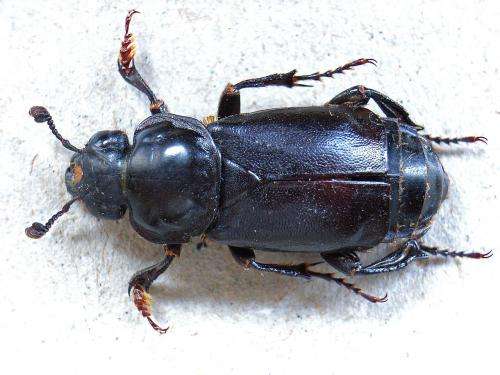January 28, 2015 report
Researchers find evolutionary reasons for homosexual behavior in beetles

(Phys.org) —A small team of researchers with the University of Ulm's Institute of Experimental Ecology in Germany has found an evolutionary explanation for same-sex sexual behavior (SSB) in burying beetles. In their paper published in the journal Biology Letters, the team describes how they tested what is known as Reeve's acceptance threshold theory in male beetles and found that the evolutionary cost of possibly rejecting females was overridden when there were few of them to choose from.
Reeve's acceptance threshold theory suggests that when gender recognition is prone to errors, the likelihood for greater acceptance goes up when there are fewer members of one gender or the other. Put another way, if a male burying beetle has difficulty determining if another beetle is male or female (which is does because gender identification with such beetles is difficult to determine) and if it is clear that there are few females around, than the males become less discriminating and will attempt to mate with whatever female or male beetle they find—because it increases the likelihood of passing on their genes (with male/female copulation, of course).
To find out if the theory holds for burying beetles, which live off the dead carcasses of other creatures, the researchers captured several specimens from a forest in Germany and took them back to their lab. Once there they subjected the beetles to various experiments, where the availability of females for mating with the males was varied. They also varied various resources such as the availability of a dead mouse carcass.
In studying the data, the researchers found that as the availability of females was reduced, the male beetles increasingly became more accepting of both male and female beetles, suggesting that as their chances for reproducing became slimmer and slimmer, they became more likely to mate with any beetle they encountered regardless of its gender, leading to increased instances of SSB. In contrast, the trend was very clearly reduced as more and more females were introduced into containers holding males.
The researchers suggest that their findings indicate that the theory appears to hold for burying beetles, and also demonstrates an evolutionary advantage for an organism to engage in SSB when circumstances warrant.
More information: Acceptance threshold theory can explain occurrence of homosexual behaviour, Published 28 January 2015. DOI: 10.1098/rsbl.2014.0603
Abstract
Same-sex sexual behaviour (SSB) has been documented in a wide range of animals, but its evolutionary causes are not well understood. Here, we investigated SSB in the light of Reeve's acceptance threshold theory. When recognition is not error-proof, the acceptance threshold used by males to recognize potential mating partners should be flexibly adjusted to maximize the fitness pay-off between the costs of erroneously accepting males and the benefits of accepting females. By manipulating male burying beetles' search time for females and their reproductive potential, we influenced their perceived costs of making an acceptance or rejection error. As predicted, when the costs of rejecting females increased, males exhibited more permissive discrimination decisions and showed high levels of SSB; when the costs of accepting males increased, males were more restrictive and showed low levels of SSB. Our results support the idea that in animal species, in which the recognition cues of females and males overlap to a certain degree, SSB is a consequence of an adaptive discrimination strategy to avoid the costs of making rejection errors.
Journal information: Biology Letters
© 2015 Phys.org


















